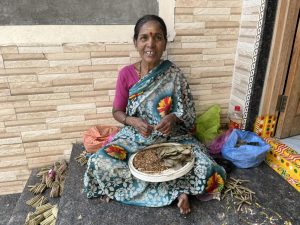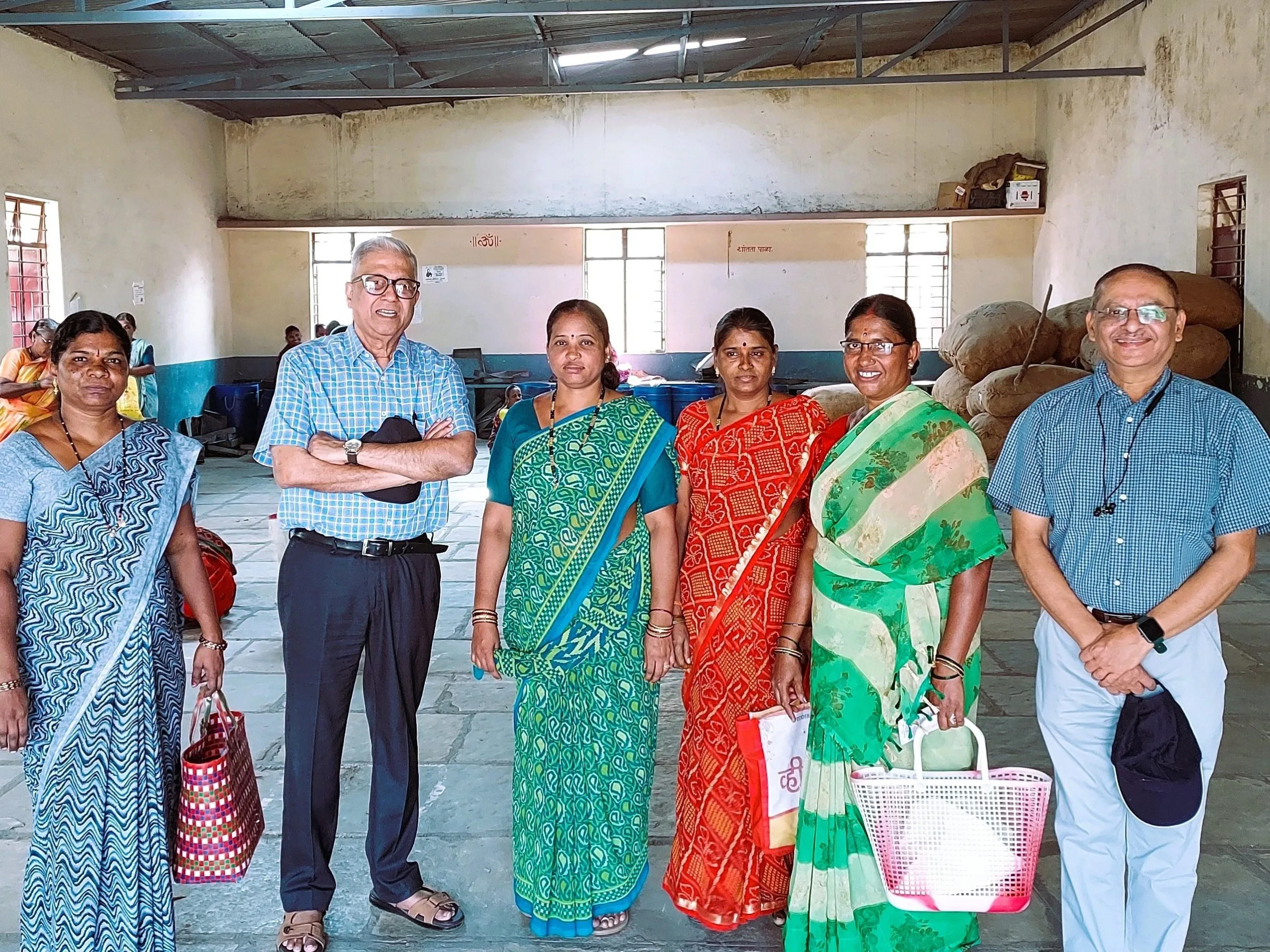The first part of this series was published earlier titled ‘Solapur – Exploiting The Beedi Workers’ and this is the second part.
Nagesh was accompanying us everywhere and was watching our interactions closely. He mentioned that his father was a textile worker while his mother was a beedi worker. I wanted to meet his mother.
Nagesh’s mother is a cheerful woman; she was sitting near the entrance of his house and she was rolling beedies! Nagesh is a successful businessman who started tailoring under the tutelage of his father and has now set up a small workshop in which fifteen modern sewing machines are installed. He has built a small and beautiful house for himself.

Nagesh has educated his children well. His son is a Civil Engineer and daughter is Electronics Engineer.
His mother must have got married at an early age because she is just sixty-six and has grown up grandchildren.
“Did you go to the school?” I asked the old lady.
“No. The master used to punish students and beat them up so I never attended school” she said as she laughed, and continued to roll beedies.
“Since when are you making beedies?”
“Ever since I was ten years old, I used to help my mother”
“How many beedies you make in a day?”
“Almost a thousand, I was always good at rolling beedies”
“Why are you making beedies when your son is earning a good income?”
“I have free time and additional money helps. Gives me confidence”
Once a beedi worker, always a beedi worker! Nagesh said that beedi workers retire at the age of 52 and get a pension of Rs 800 to 1000. His mother had retired but she was making beedies and earning extra money.
A party activist from Adam Master’s office was accompanying us, and we walked towards the slum area.
‘Come in’, he said. We entered his house. It was a very small house, actually one room house, maybe 12 feet by 10 feet, and it had a kitchen platform in one corner and a bed in another. A small TV was mounted on the wall above the bed. In one corner a plastic tank was placed at a height of three feet for storing water and drawing from it. Many parts of Solapur receive water once in five days!
Two women were sitting on the floor, one was cutting Tendu leaves using a pair of scissors. A Tendu leaf is cut in a rectangle shape. Before cutting it, they dip it in water and make it moist so that it can be easily rolled. The other woman was rolling beedies. She had cut leaves and tobacco in a cane plate. She was rolling beedies at a very fast speed.
We greeted the women, and they smiled but continued their work.
“They speak Telugu. There is a large population of Telugu speaking people in Solapur and many of them belong to the Padmashali samaj.”
Padmashali samaj is essentially the community of weavers who migrated from Telangana to Solapur in search of jobs. Solapur had many textile factories earlier; it began with handlooms and got upgraded to power looms. But the power loom sector is affected by the stiff competition from the North. One hears about industries in Panipat which sell Solapur chadar in Solapur!
“The women make Beedies, make breakfast and then leave for the center which collects beedies. They hand over the produce which is weighed, and records are maintained. They are paid thru the bank once in a fortnight (at another place we heard that they are paid once a month) based on their output.”
The two women smiled and wished us but did not stop working. The younger woman was rolling beedies with amazing speed.
“All through the day they roll beedies. Some of them have been doing it ever since they were little girls. It was not rare to find a ten year old rolling beedies to help her mother, things are changing now.”
“They handover the beedies at the center and buy vegetables on their way home. In the afternoon or evening a group of women can be seen sitting together and rolling beedies while chatting endlessly”
I remembered my childhood days. My mother and her women friends from the neighborhood would sit in a circle during the summer making ‘papad’ and other products. There was a clear understanding about how the final produce will be shared. It was a social gathering where work brought them together, but friendships were strengthened. And a lot of information about their world was exchanged.
“Do they go out in the evening?” I asked and instinctively knew the answer.
“No sir. They keep rolling beedies till it is dinner time and then resume making beedies after dinner. Some can be seen rolling beedies even at midnight.”
The center where they deposit their produce is also the place where they collect Tendu leaves and tobacco. It is weighed and given.
“Do they give it enough to make thousand beedies?”
“No, sometimes it is not good enough. The women then buy more Tendu leaves and tobacco. It means more cost.”
As we walked, we came to the residence of a corporator. She was also involved in rolling beedies! Believe it or not!!

Becoming a corporator in Mumbai or Thane is like getting a lottery of crores. They move in flashy cars. I was meeting a Solapur corporator who rolled beedies to earn her money!
We kept walking.
I wanted to speak to a group of women. “It is 11.30 am now and many of them would not be at home. They would have gone to the collection Centre” she said.
We left for the collection center. It was a large godown. Women were sitting in groups and depositing their produce. The manager, a young lady in her early thirties, told them that we had come there from Mumbai.
They showed their katta (pack of beedies) kept in a tray. I clicked a photograph. I started a conversation with them.
“How much do you earn?”
“Rs 4500 to 5000 a month”
“What do your children do?”
“Sir my daughter works in Dubai”
“And my son has just passed his MCA”
“Wow!”
They were proud of their children.

“Are you also a graduate?” I asked the young woman manager. And instantly her eyes became moist. She turned her face away. Foolish question, I said to myself, a big faux pas!
“Tenth Standard, Sir” she replied. I apologized.
“My mother also used to roll beedies.” She was suggesting that it must have been difficult to finance her education.
“Girl’s education is free so many are getting well educated” my guide said. He was unaware of my conversation with the woman manager. If a girl is a ‘card holder’, meaning she is employed in beedi industry with full benefits of social security, she will have many suitors for marriage. This is like men preferring brides who have a Government or a bank job in Mumbai.
“These women supplement the income of their husband, but trouble starts if he is unemployed or has vices”
“What happens?”
“The money is paid in the bank by Beedi company. But the husband keeps the ATM card with him. He withdraws money at will, and the woman keeps rolling beedies”
“Some ladies find a way out – they work for ‘spurious’ beedi product maker who pays cash. That’s the way to circumvent the bank transactions and get money in hand”
“Sad!”
“They work like slaves then, the employer exploits them and so does the husband.”
This is the latest method of enslaving people. I recently met an HR Manager who worked in Bihar, in a mining company. The minimum wage there was Rs 8000 approximately, but the miners were paid only Rs 4000. The labour contractor who got them the job would take away the ATM Cards of all workers; the company would credit minimum wage to the workers’ bank accounts, but the labour contractor would withdraw his cut of fifty percent of the wages.
“That’s the system!” The HR manager told me. If the workers protest there will be no job for them, there is always someone to work for four thousand rupees, so they settle for Rs 4000, they know that they can’t fight the system!”
I saw a parallel in the beedi industry. There was this ‘Gulla Katta’ of taking away fifty beedies without compensation, it is a steal, and then there is ‘Chaat Beedi’ in which good beedies are often ‘rejected’ and not paid for under the guise of quality control.
All this results in the inevitable – borrowing money and getting in the debt trap. There were reportedly a few suicides during the pandemic.
What happens in Solapur and Bihar is also happening in other states and industries. The vicious cycle of exploitation and debt trap. And suicides. The biggest sufferers are women as we know.
Arvind Shrouti names three types of worker groups. The first group includes of casual workers, those we see at the railway station, or some ‘Naka’ waiting for the contractor to come and take them for work. They are outside the periphery of industrial organizations. He calls them ‘vanchit’ or ‘the deprived’. They are available for exploitation!
The second group of workers are those who have entered the industry, yet they are exploited. Trainees (under the government schemes they remain trainees for years together), contract workers fall under this category. Arvind calls them ‘Shoshit’ or ‘The exploited.’
And finally, we have a group of ‘permanent’ workers (managers included) who watch the exploitation and look other way. Arvind calls them ‘Sammilit’ or those who have joined hands with the exploiters. They are partners in exploitation by their acts of commission or omission.
This is the stark reality of industry today. A deadly combination of exploitation and numb minds which make no attempt to change the situation.
Jai Ho!!
(The third part in this series of blog posts will cover housing for beedi workers)
Article originally published at vivek’s world – https://vivekvsp.com/2025/03/beedi-workers/
Stay connected with us on social media platforms for instant updates click here to join our LinkedIn, Twitter & Facebook
























